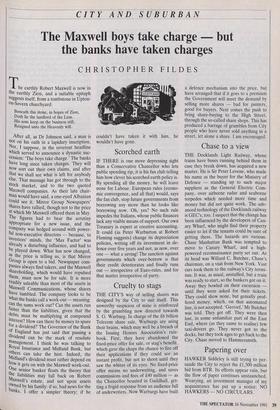CITY AND SUBURBAN
The Maxwell boys take charge but the banks have taken charges
CHRISTOPHER FILDES
Beneath this stone, in hopes of Zion, Doth lie the landlord of the Lion. His sons keep on the business still, Resigned unto the Heavenly will.
After all, as Dr Johnson said, a man is not on his oath in a lapidary inscription. Nor, I suppose, in the reverent headline Which served to announce a dynastic suc- cession: 'The boys take charge.' The banks have long since taken charges. They will now sort out their own claims, and after that we shall see what is left for anybody else. That message has got through to the stock market, and to the two quoted Maxwell companies. As their late chair- man would have said, a one-eyed Albanian could see it. Mirror Group Newspapers' Shares have rallied, though not to the price at which Mr Maxwell offered them in May. The figures had to bear the scrutiny appropriate for a new issue, and the Company was hedged around with power- ful non-executive directors — because, to investors' minds, the 'Max Factor' was already a disturbing influence, and had to be played down. What has now changed, as the price is telling us, is that Mirror Group is open to a bid. Newspaper corn- Panies always find takers, and the Maxwell Shareholding, which would have repulsed them, must now be for sale. It is more readily saleable than most of the assets in Maxwell Communications, whose shares have tumbled. The company looks to be What the banks call a work-out— meaning: can the sums work out? Can the assets run faster than the liabilities, given that the debts must be multiplying at compound interest? How can there be money to spare for a dividend? The Governor of the Bank of England has just said that passing a dividend can be the mark of resolute management. I think he was talking to Royal Insurance and Midland Bank, but Others can take the hint. Indeed, the Midland's dividend must rather depend on HOW it gets on with the Maxwell work-out. One senior banker floats the theory that the liabilities may fall back on Robert Maxwell's estate, and not upon assets owned by his family: if so, bad news for the banks. I offer a simpler theory; if he
couldn't have taken it with him, he wouldn't have gone.










































































 Previous page
Previous page